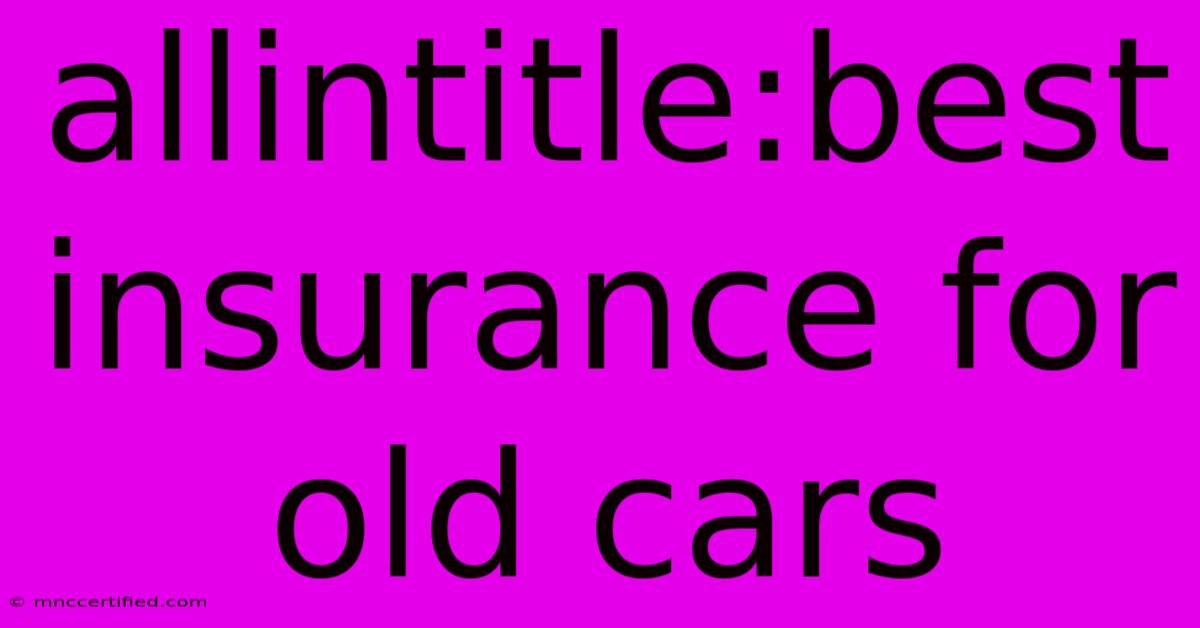Allintitle:best Insurance For Old Cars

Table of Contents
Finding the Best Insurance for Your Classic Car: A Guide for Vintage Vehicle Owners
Owning a classic car is a dream for many, but insuring it can be a unique challenge. Unlike modern vehicles, older cars often require specialized coverage that goes beyond standard auto insurance. Finding the best insurance for old cars involves considering several factors, from the car's age and value to your driving habits and the level of protection you need.
Understanding the Challenges of Insuring Classic Cars
Here's why standard auto insurance might not be ideal for your vintage vehicle:
- Value Fluctuation: Classic cars can appreciate in value over time, meaning their market worth might be higher than their replacement cost. Standard policies might not offer enough coverage for this.
- Unique Parts: Finding replacement parts for older cars can be difficult and expensive. You'll need a policy that accounts for these challenges.
- Limited Usage: Many classic car owners drive their vehicles only occasionally. Standard policies might not consider this factor and charge higher premiums.
- Collector Status: Some classic cars are considered collector items, requiring specific coverage for events like shows and rallies.
Types of Insurance for Classic Cars
Here are the common types of insurance you should consider:
1. Agreed Value Coverage: This is often considered the best option for classic cars. You and the insurer agree on a specific value for your vehicle, and you'll receive this amount if it's totaled, regardless of its actual market value at the time of the accident.
2. Stated Value Coverage: Similar to agreed value, this type allows you to set a value for your car. However, the insurer may offer a lower payout than the stated value in case of a total loss.
3. Actual Cash Value (ACV): This type of coverage is common for standard vehicles and pays out the current market value of your car, minus depreciation, in case of a total loss. This is usually not the ideal choice for classic cars due to depreciation.
4. Classic Car Insurance Specialists: Many specialized insurance companies cater specifically to classic car owners. They understand the unique needs of these vehicles and offer tailored policies.
Essential Factors to Consider When Choosing Insurance
- Car's Age and Value: The older and more valuable your car, the higher your insurance premium will likely be.
- Usage: How often do you drive your car? Policies for occasional use might have lower premiums.
- Location: Where you live can impact insurance rates.
- Driving History: Your driving record can influence your premiums.
- Additional Coverage: Consider adding coverage for:
- Agreed Value Coverage: Ensures you receive the agreed-upon value in case of a total loss.
- Parts Replacement: Covers the cost of finding and installing specialized parts.
- Storage Coverage: Protects your car while it's in storage.
- Roadside Assistance: Provides help in case of a breakdown or accident.
Tips for Finding the Best Insurance for Your Classic Car
- Compare Quotes: Get quotes from several insurers, including specialized classic car companies.
- Read Policy Documents Carefully: Pay close attention to coverage details, deductibles, and exclusions.
- Ask Questions: Don't hesitate to contact insurers with questions about their policies and coverage.
- Consider Membership Organizations: Some organizations offer insurance discounts to members who own classic cars.
Conclusion
Finding the best insurance for old cars requires a thorough approach and careful consideration of your car's unique needs. By understanding the challenges of insuring classic vehicles and researching the various policy options, you can find the right coverage to protect your investment and enjoy your vintage car with peace of mind.

Thank you for visiting our website wich cover about Allintitle:best Insurance For Old Cars. We hope the information provided has been useful to you. Feel free to contact us if you have any questions or need further assistance. See you next time and dont miss to bookmark.
Featured Posts
-
Scherzinger Clarifies Comments On Russell
Nov 09, 2024
-
Todd Golden Faces Harassment Accusations
Nov 09, 2024
-
American Family Insurance Layoffs 2023
Nov 09, 2024
-
How To Watch Ncaa Unc Vs Kansas Game
Nov 09, 2024
-
Duke Dominates Army Six Players Score 10 Points
Nov 09, 2024